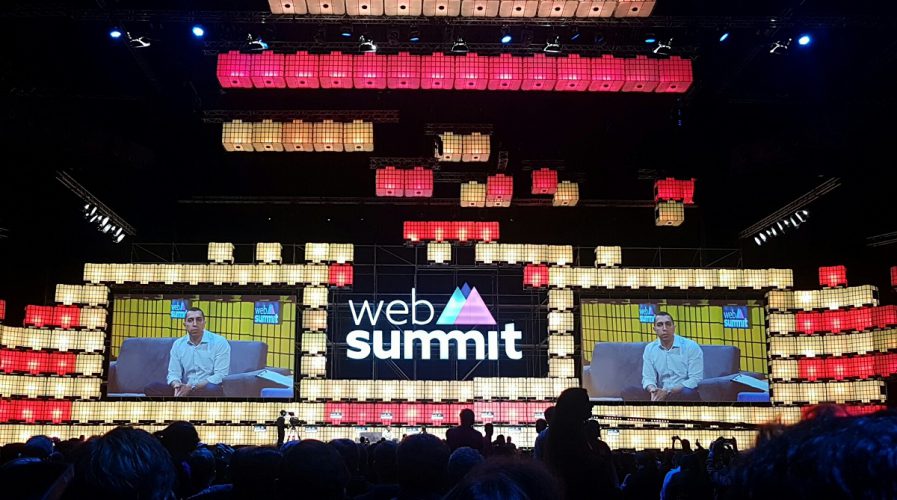
Web Summit 2016 in Lisbon. Pic: Nicole Kow
What we learned: Web Summit 2016 on diversity, developing countries, and conscious tech
By Nicole Kow
LAST week, 53,056 attendees from 166 countries arrived in Lisbon for the world’s largest tech event, Web Summit, to meet, exchange ideas and get inspired by world-renowned tech entrepreneurs. Previously held in Dublin, the event packed in 21 conferences where tech phrases like ‘virtual reality’, ‘artificial intelligence’, ‘augmented reality’, and ‘blockchain’ were heard in talks about fashion, autonomous vehicles, sports, software, refugees and much, much more.
Industry leaders shared their knowledge and experience on different stages, inspiring and exciting attendees for what the future holds. Here are a few things we learned from the Web Summit.
Existing in silos
On the second day of the summit, we woke up to news of Donald Trump becoming America’s new president, which predictably became the centerpiece of many panel discussions. Most millennials attending, from middle to upper middle class Americans and the powerful minority, did not see this coming. The polls were embarrassingly incorrect and shockingly unrepresentative of the U.S. The same goes for Brexit.
TOLD YA SO: Stunningly Inaccurate: Polls Were Off 7.4 Points in States Trump Won (Video) https://t.co/9FOixTQs7S
— Bill Mitchell (@mitchellvii) November 10, 2016
Everybody keeps sending me polls that Bernie would Have beat Trump. Didn't this election teach you not to trust polls?
— Charlamagne Tha God (@cthagod) November 11, 2016
What was discussed at great length was the effect of silos and echo chambers that exist on social media. “If the industrial age was about standardization, the digital age is about customization,” said Ann Mettler, head of the European Political Strategy Centre (EPSC), the in-house think tank of the European Commission.
Thanks to effective algorithms on Facebook and Google, we see content curated specially for us. We’re fed information we agree with and aren’t exposed to opposing arguments, which means we have ended up with a society that holds polarized views, and one that never interacts or engages in discussion.
Yet, for a democracy to work, we need to be exposed to both sides of the argument. We need all the facts and all the figures. We need to have our views challenged and challenge the views of others. Debates and discussions must happen and more importantly, very aptly put by Ann Mettler: “We need to educate ourselves about the responsibilities we hold in a democracy”.
Looking at India and SEA for the next billion users
“Google and Facebook need to keep growing. To do that, they need more users”, Nathan Eagle, CEO of Jana.
With Western markets saturated, tech companies are looking at developing countries for their next billion users to come online. Many predict that India, Indonesia, Malaysia, Thailand and Vietnam will become the next economic superpower within the next 50 years. If that’s where growth is, we’ll see more investments pouring in to building infrastructure to facilitate this growth.
SEE ALSO: ASEAN gets new angel investment group to improve cross-border trades
It’s all about experiences for millennials
“Millennials question everything and you better do too!” said Jared Smith, co-founder and COO of Qualtrics. He advises businesses who want to build their reputation among millennials to continually question their customer experience online and offline.
Online, use A/B testing to figure out what works for your customers and what drives a better experience. Offline, make sure your team understands the value of excellent customer experience and empower them to deliver a great one.
Superb customer experience should be a core competency of every business if they want to thrive in today’s market.
Diversity in tech

Pic: Pexels
“If you’re not tall, white and male, it can be hard to imagine or stand into a leadership role,” Dave McClure, Founder of 500 Startups.
Gender diversity was another commonly discussed topic throughout the conference. It’s funny how the tech industry, that prides itself in being disruptive and innovative has yet to crack the code for this issue. If we think about ecosystems, they thrive on biodiversity. If we think of effective solutions, they succeed because of diverse thinking. Businesses thrive when they hire more women, and when women are in leadership too.
“At the end of the day, it boils down to this: You need to believe it is the right thing to do”, said Rebecca Parsons from Thought Works. “We have so many women leaving technology… we work so hard to get them in and then the culture isn’t welcoming.”
Want to get more women in tech and get them to stay on? Start from the beginning.
“Acknowledging you don’t have a diverse network and defining how you’re going to hack it is the first step”, advises Cathryn Posey, founder of Tech By Superwomen.
SEE ALSO: Team Indus’ Sheelika Ravishankar: Becoming the first private Indian firm taking a moon shot
Be intentional about diversity and communicate your values clearly and consistently to your employees. “If you hear a man continually talking over a woman, stop them,” says Rebecca Parsons. Empower other women and give them credit where credit is due. Actively call out sexism in the workplace. “If you’re a CEO, make sure you’re the Chief Diversity Officer of your company”, Cathryn Posey.
Injecting a conscience into tech

Pic: lassedesignen/Shutterstock
Here are 3 quotes that sum up the future of tech pretty nicely:
“Spend your time working on something that drives the universe in the direction you want to see it go.” Leila Janah, founder and CEO of Samasource and LXMI.
“Today we’re lacking ethical leadership, we’re lacking conscience… No app is going to provide conscience.” Salil Shetty from Amnesty International.
“The thing that rules the day is authenticity. In an age of filters what we’re really after is truth. It scales” – Alexis Ohanian, co-founder of Reddit.
READ MORE
- The criticality of endpoint management in cybersecurity and operations
- Ethical AI: The renewed importance of safeguarding data and customer privacy in Generative AI applications
- How Japan balances AI-driven opportunities with cybersecurity needs
- Deploying SASE: Benchmarking your approach
- Insurance everywhere all at once: the digital transformation of the APAC insurance industry
